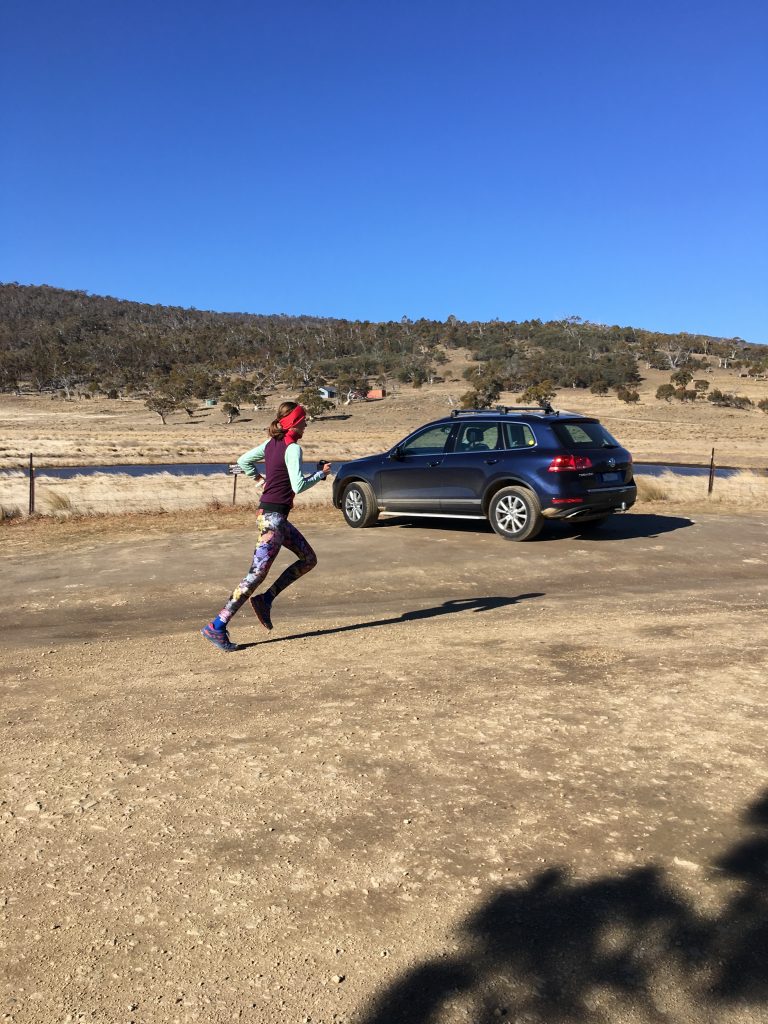How to Build Mental Toughness For Runners
How to Build Mental Toughness For Runners
Running is a very physically tough, and psychologically demanding sport. Mental skills training for mental toughness is an essential ingredient in any pursuit that you desire to reach your full potential in and explore your boundaries. This goes for sport and life in general. We have to find that balance of physical and mental training and recovery. Interestingly, mental skills training fatigues the brain, as does a hard session fatigue the body – so we must train, recover, and adapt.
Your mind can be your best friend or your own worst enemy. It’s important to establish some tools to utilize when out training, racing or facing your next physical challenge. To run at our very best, it’s important to recognize what your own strengths and weaknesses are. In doing so, you can take advantage of your strengths, and become more aware of areas you struggle a little more with. Think of it as optimizing your own mental toolkit.
If you want to find out what your top character strengths are, take this quiz run through The University of Pennsylvania (yes, it has quite a few questions, but it should take way too long and it is reliable!). You’ll have to enter a username and email, don’t worry, you won’t get spammed. Take the Top 7 as your top character strengths. I did this, and my results showed my top strength was curiosity and interest in the world, the second was fairness, equity and justice, and third, creativity, ingenuity, and originality. I keep these in mind when I approach running training, teamwork, and racing. This way I can truly frame my running mindset to assist me in performing at my best.
What is mental toughness?
Mental toughness is the ability to perform at a high range of your potential consistently, under the ever-changing and often unpredictable conditions of competition and high-demand situations. A mentally tough individual will be able to execute their task with a desirable level of focus, determination, resilience, and calmness under stress and pressure.
Mental toughness is often a key determiner whether you finish at the front or at the back of a pack. One study conducted on Australian footballers determined that the group that exerted the highest levels of mental toughness favored “both mastery- and performance-approach goals and self-determined as well as extrinsic motivational tendencies”. In the paragraphs below, I’ll go into more detail about these specific mental skills which can be adopted to develop mental toughness.
The great thing about mental toughness is that it can be developed and trained, and studies have shown that it is innate to humans as it was a crucial characteristic that impacted survival ability in prehistoric times. We train mental toughness by building an ‘artillery’ of mental skills. These are characteristics such as focus, determination, dedication, resilience, performing in high-pressure settings, selective emotional ability under high-stress situations, confidence, perseverance, self-belief, the ability to work with a team, positivity in difficult situations and motivation (I’m sure there are many more you can think of!). Some of these character strengths you will find come more naturally to you, whilst others will require practice and work. Ultimately, it is about honing in and capitalizing on your strengths and improving weaknesses that could be beneficial to your sport or endeavor.
We can build mental skills in a sports psychology setting or make time to deliberately practice them. We are kidding ourselves as dedicated sports people if we think that mental toughness is something that will come magically to us – it takes dedication and deliberate commitment to improve at anything and perform at a high level. I personally utilize sports psychology through the collegiate system. A general session involves assessing strengths and weaknesses, reflecting on the experience, and how I could go about the scenario next time. A sports psychologist or mental skills trainer will assist in building key areas to perform well at the particular discipline and to meet the personal needs of the athlete.
You’ve already taken the first steps to build your mental toughness by simply educating yourself on what it is. I found it super helpful for my own pursuits to learn that our body can actually go beyond our physical perception of pain and tiredness when we hit this stage in a race or hard training session. The voice in your head telling you to “slow down”, “stop”, “give up”, “this is too hard” is better known as the pre-historic brain/ monkey brain or mind/survival instinct mind. It is simply your brain trying to stop you from hurting yourself. It doesn’t know the difference between a race and a real situation of life-or-death. Just like your legs don’t know you are running a 10km race, rather than a hard 10km training session with your teammates. It’s all in your mind. Mental wandering and negative self-talk are the key inhibitors to us performing at our absolute physical best. This is why it is essential to train will-power, self-control and decision making under pressure. We need to find a way to automate decisions and execute a plan of some sort, to prevent the mind wandering.
How does the mind work in a hard training or race scenario?
When we race or train hard, the pain and discomfort we experience are from the emotional part of our brain, as I mentioned before. It is intended to protect us. We simply need to make a decision – the brain will process this decision based on a number of factors, including personal expectations coming into the event, past experiences in similar situations, level of desire to achieve (resilience, motivation, goals, perseverance), and stimulus feedback to the brain, including fatigue, fuel, environmental setting etc.
There are a couple of things we can do to calm the monkey mind, take the extra stress and anxiety out of the race day or hard session equation. Firstly, we can train our willpower. Will power is the ability to control your attitude, thoughts, feelings, impulse, and execute a task with clear, beneficial, goal-oriented decision making. You probably already exercise it in some sense – like setting an early morning alarm for training and not questioning whether you go or not. You just do, it’s not really a decision up for debate. Same with attending a hard training session you might be dreading. Unless injured or sick, show up and see how it goes – you may just surprise yourself. However, as humans, we only have so much will-power each day. Take into account that our will-power is highest earlier in the day, along with our ability to exert self-control. This is where the common notion of doing your hardest tasks earlier in the day, or first thing comes into play.
The harder and more stressful the decisions, the number of decisions, and the complexity of decisions all dip into our will-power stores. The goal is to make a lot of these decisions more automated (subconscious) and focus on the ‘when’ of the decision (timing is everything), rather than the how, which can cause extra stress if over-thinking occurs.
We want to capitalize on the time of day when we will make the best choices, and practice our strategy of will-power and decision making at this time of day to suit our needs.
Just like physical activity requires recovery, so do mental reserves including will-power (recovery is just as important, it is where we get stronger, after being ‘broken down’ in some sense in training). If our willpower is low, our ability to make clear and beneficial decisions and exercise self-control is hindered. Physical fatigue will also contribute to lower will-power which in turn, impacts decision making + self-control. Sleep, adequate recovery, and nutrition can aid us in these areas. Athletes or high-achievers in any discipline should aim for at least 8hrs of sleep a night on most nights to perform at their best. It has even been stressed to me many times that 9-10hours is ideal – however many of us would struggle to do this in today’s busy world. Healthy, energy-dense meals are also key. Carbohydrates (in particular – glucose), fuel our brainpower. If you experience ‘mental fog’ or ‘blur’, this could be a reason why.
What are some mental running strategies?
- Set yourself some goals and intentions! You’re going to hate me when I say, ‘write them down’. Really – do it. Get it on paper, or record it via voice memo if you must. Whatever. It is just crucial that these goals become a physical manifestation in some sense. I like to stick mine on the wall. Goals work best if they are categorized:
- Process goals: this is the ‘journey’ as I like to put it. Where you’ll direct your focus and deliberate intention
- Performance goals (short term and long term): aka. Some short term goals may be new PB in this 5km race or run comfortably for 10km. These goals help focus our execution and are the technical and strategic notch in our belt. A long term goal could be to qualify for a team, eventually run a marathon (make sure you do some very solid, consistent, long-term training to build up to this!)
- The more detail, the better. List your hows, whys and ways of getting there. There are many paths to achieving a particular goal.
- Be flexible. Things change, life chucks curve balls. The more practice you have at adapting and adopting, the better off you’ll be long term.
- Self- talk. You have to practice this. A great website I came across explains self-talk as:
“Self-efficacy is the unshakeable belief of an athlete that they can meet the challenge they are facing. It is arguably the cornerstone for any great performance.”
We must question our own inner dialogue. Are our thoughts mostly negative? positive? What emotion is behind most of our thoughts? Recognize your own patterns! Often our mental talk/self-talk is habitual. So if any bad habits have formed which are not of benefit to your performance, or hold you back in any way, it’s time to put in some work to change them.
My in-race or session self-talk is very simple, involving just a few ‘cue-words’ that are easy to digest for the brain in a high-pressure, fatiguing situation, and don’t have any emotional association words involved in the phrase (things like good, bad, can’t, can etc.). My coach in Australia taught me to adopt ‘breathe, relax, momentum’. I have thought these 3 keywords for an entire 5km race. It worked a charm. If I felt my mind start to wander, I drew it back to these simple thoughts. I had already thought through my race execution plan, so this is all I had left to think about. Remember, on the track, course, court, field, meeting room- wherever you are trying to execute at your full potential and at a high-level – you are your own best friend or worst enemy.
- Exercise your ability to be in control yet flexible to challenge and change. Often a scenario will change in a race very quickly. This is what makes them so exciting. You should be ready to adapt your plan and decisions based on perceptions and feedback. This is best practiced through hard training sessions and racing. Throw yourself in the deep end, and learn from mistakes, then try again.
- Make decision making more automatic. The more decisions we can make subconscious, often the better. This is because less energy is used to make this particular type of decision. Again, racing and training is the place to practice and learn how to execute this mental skill. Personally, by the end of track season, I have cultivated a very personal plan as to how I best execute my distance (1500-10km). I take into account a sit-and-kick race situation, or a slow burn scenario, and go from there. I practice both conditions in training, so I can put my best foot forward if I need to sprint from home or maintain a high-pace for a longer period of time. I also learn to prioritize my decisions – don’t sweat the small stuff, particularly things you can’t control, such as the weather.
- Glucose levels! Not really a mental skill, but worth a mention. New research shows that a hit of glucose (in the form of glucose-rich food) can temporarily restore our mental strength including will-power and ability to make good in-race decisions. This is because to perform at our best psychologically/mentally requires adequate blood glucose levels in the brain. You hear about nutrition strategies in the marathon which is for physical and psychological benefit. However, the question being posed now is? Even in shorter races less than an hour in which our glucose levels will not be depleted too significantly, could a shot of it benefit our mental capacity? Food for thought. Literally.
- Sleep. It is commonly known that 6hrs or less of sleep, particularly bad sleeping patterns over a long period of time will impact our mood, emotional capacity, ability to make good decisions, mental clarity, self-control, and will-power.
- Learning to relax in a high-pressure scenario, such as a race. If we stress too early, we are draining energy, which is detrimental to our race. A way to practice this is to work on persevering when pain, fatigue, and tiredness hit us in training and less-important races, so we are ready for the big day/important side of the season.
- Framing and perspective. Don’t be too hard on yourself if you don’t meet your expectations. Even expectations of others. You are only human, and I know most athletes don’t go through rigorous training to not put their best effort in on race day. We are not here to waste time and opportunity. If you don’t achieve what you desired, give yourself a certain time to be upset, and then move on and reflect, focusing on the next thing. The great thing about sport is there is always another race/event/challenge. Give yourself a pat on the back every now and then too. Running isn’t life or death, it is something we do, love, enjoy and at the end of the day, it should be fun!
Returning briefly to the mental framework – make sure you don’t do any mentally challenging activities too close to a race or difficult training session. This is because our ability to perform is hindered when we are mentally fatigued. Again, this involves will-power, which impacts decision making, emotional state, and self-control. The more we race and put ourselves under these high-pressure conditions, the more we train our will-power to work in a positive symbiosis with pain and onset fatigue.
Does Visualization or Imagery help with training mental toughness for running?
Visualization is the process of establishing mental imagery of how you might like to execute the race. This technique is a mental skill that should be a part of our mental skills ‘toolbox’, as I like to put it. It is how in ‘theory’ you can experience race day and run the race before you have actually run it. You can visualize pre and post-race processes, and the race itself. For example, this could involve the morning of the race, how you’ll feel warming up, and/or the race itself. In terms of race visualization, I personally like to mentally run through sections of the course and have a best-case scenario and plan B strategy ready to go. If you can see the racecourse beforehand, or have a map as a second-case scenario, base your visualizations off this. As this was my first cross-country season in the NCAA competition, I had to plan my visualization off maps, and then the day before the race after running on the course, I could base my imagery off the course itself. I actually enjoyed this process, as moving from map to the physical reality of the course allowed me to make mental connections which were much more memorable. Think of it as an ‘ah huh!’ moment, like when I realized that the hill we were jogging up on course inspection was the big long one I planned to overtake others on based off the course map we were given a few days before. For some athletes, it is possible to visualize their plan/s of execution from the start to finish. If this resonates with you and your scenario, go with this.
You do have to find the time to practice visualization. I like to practice before I go to sleep at night. This way, it is the last thing I contemplate for the day. I channel how I want to feel emotionally, how I envision my body moving across the course, how I will take certain corners, undulations, hills, and the finishing sections. Yes, it is detailed, but it is worth the effort. You’ll feel less nervous on race day, coming into it with a flexible plan of execution that is thought through. Consider making it a habit, and a part of your race day routine and strategy.
How do you stay motivated to keep running and training?
You are in control of how you feel and choose to feel, and as soon as you can recognize this, you can start practicing your ability to exercise this and enhance it as mental strength. A good word for it is attitude. I’m not saying emotionally regulate, we all feel tired and lack motivation sometimes, and in turn, heading out for a run or doing that tedious task you had on your list for the day is the last thing on your agenda. Acknowledge it, and then take action as to how you will approach the task ahead. Often, you’ll feel better having done it. Luckily in running, you get that lovely endorphin high, which is a natural mood booster.
When I say ‘take action’, what I mean is to make the decision on your attitude. This can involve the decision to pump yourself up and carry out some mood-boosting actions or ease into the run with a sense of calm and mindfulness. As an athlete, you’ll need to figure out what these techniques are for you. I will go into some personal examples below.
Motivation also correlates with expectations – you can set them for yourself or choose to let the run unfold more naturally. When I’m tired, I take it one step at a time like putting on my shoes, stepping out the door, and zoning out to a podcast. The best athletes in the world know what amplifies and intensifies their feelings (boosts their desire to train, in a sense). For me, it’s playing some high energy music, doing my hair in braids or in a potential race hairstyle I want to try, and putting on what I consider my ‘fast’ activewear. If I want to calm myself down after a stressful day, I will focus on my breath, or rope a friend or teammate into training with me if it is a solo session (it helps distract from the ‘tiredness’ or stress, which often we carry in our body).
It is impossible to be in a high-energy, motivated state all the time, but we can develop the mental skills to get us out the door regardless of our emotional state. Who knows how you will feel on race day? Think of it as practice for that. Often goal-setting helps us stay on track and find that bit of motivation we need to push forward. I like to make it an unquestionable decision. Unless I’m sick or injured (and all the other situations I don’t need to list), I go. It is a part of my routine and I’m a better Lara to everyone if I do, no point in denying that!








